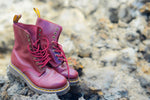
Are Doc Martens Good Work Boots?
, by Ed Stone, 5 min reading time

, by Ed Stone, 5 min reading time
But are Doc Martens good work boots?
Doc Martens are best suited for indoor work environments. However, they may not hold up if your daily operations include trekking over uneven terrain, climbing ladders, or performing heavy shovel work.
That said, your Doc Martens shoes will offer superior comfort and support, making them the perfect footwear for certain jobs. Thinking of wearing your Doc Martens to work? Here’s what you should know.
Doc Martens were originally designed as a work boot.1 When the Griggs family started making and selling the shoes at the beginning of the 1900s, they quickly became popular for their sturdy quality and use of durable materials.
But it wasn’t until the Griggs family teamed up with Dr. Klaus Maartens in the 1960s that the Dr Martens boot we know today was born. After breaking his foot in WWII, Dr. Maartens developed a special air-cushioned sole that he figured would be more comfortable than the standard hard leather insoles used at the time.
Maartens was right, and eventually, this invention would help make Doc Martens the go-to boot for a variety of European workers, especially:
These days, however, wearing a pair of Doc Martens boots probably says more about your sense of style than your occupation. Thanks in large part to the punk, grunge, and other counter-cultural icons who adopted the boots by the end of the 20th century, Doc Martens have become a shoe brand of worldwide significance, donned by everyone from trendy seventh graders to red carpet renegades.
So, are Doc Martens comfortable for work?
If you work in certain industries, like hospitality or warehouse management, Doc Martens boots have certain qualities among those safety shoes for women and work shoes for men that make them a great way to protect your feet on the job. Here’s why.
Dr. Martens shoes originally designed his air-cushioned sole for therapeutic reasons. This feature popularized the boots in the 1940s and ‘50s, amongst working class men and women.
It’s that air-cushioned sole that provides Doc Martens work boots with most of their comfort. Trademarked “AirWair” by the brand, these soles are filled with tiny air bubbles. These bubbles create pockets of air throughout the soles that give them their unique bounce and spring.
As such, Doc Martens can be the perfect work shoe for indoor jobs that require long periods of standing or walking, like:
However, be aware that a brand new pair of Doc Martens might not be the most comfortable shoe you’ve ever worn. Although the leather used in certain models will eventually mold to the shape of your foot, this can take time. Be prepared for a period of adjustment when your boots are fresh out of the box.
Men’s and women’s Dr Marten might be a good work boot if you work in a place like a restaurant or a warehouse where you frequently encounter wet floors—that is, as long as you choose a style with a slip-resistant sole. Knowing how to take care of your slip resistant shoes as well as learning how to keep your feet dry in work boots, can help to increase the lifespan of your work boots.
The good news is that Doc Martens produces a line of boots in various styles that feature slip-resistant soles. At work, these men’s work boots and women’s work boots can help keep you upright when floors get wet from:
Doc Martens has not completely forsaken its working-class roots. In fact, in addition to boots that offer slip protection, they design a range of steel-toe boots that can help protect your toes from harm.
In some of their industrial styles, Docs Martens uses a steel toe that can protect your toes against weights of up to 75 lbs, or pound-force, according to their website. This satisfies the most recent ASTM safety standards for work boot safety as determined by the American Society of Test Materials (ASTM). That’s good news if your job leaves your toes vulnerable to collisions with heavy objects.
That said, wearing your Docs to the construction site might not be the best idea. Contractors, electricians, engineers, and others who work in high-hazard trades should always wear a shoe that meets all the safety standards and requirements outlined by ASTM.
Although Doc Martens does have shoes that are EH and ESD rated, not all styles are designed to keep you safe from dangers posed by:
Lastly, Doc Martens might not be suitable if you work outdoors and have to navigate uneven terrain, as the height of many styles can lead to rolled ankles.
At Boot World, we believe that supporting workers begins with supporting their feet. That’s why we rely on the latest industry knowledge and innovative shoe technologies to bring you the best footwear available, including Doc Martens men's boots and Doc Martens women's boots—plus a fantastic lineup of additional work boot brands, too.
Work smart, shop Boot World